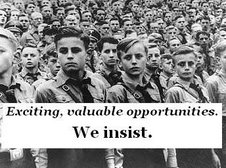I'm a bit late on this one from EU Referendum -it seems the EU is getting itself worked up about having a common emergency number and wants member Governments to make more effort to condition us to use 112.
Today is 11 February which, expressed in numerical form is 11/2 – something which the EU commission could not let pass – 112 being the single European emergency number.
It has therefore launched a new initiative, calling for "EU citizens" to be "better informed" about the number.
As usual this is a complete waste of time and money and another case of the EU focusing on something for cosmetic reasons in the name of "integration". To understand why we need to look at some history and techie stuff, but I will simplfy it.
You need to know that the telephone exchange provides the power for your phone to work by putting a voltage across your line. In the normal condition the circuit is not made (open) and therefore no current flows. The first telephone systems used currrent pulses on the line to tell the exchange what number was being dialled and they did this by the telephone dialler making and breaking the circuit to the exchange and so drawing current pulses at a set timing interval.
You may remember that early telephones had rotary dials and for the exchanges to work the dialer had to release at a constant pace so the exchange could detect the pulses correctly. This type of operation is susceptible to "noise" from lightening, car engines, early vacuum cleaners and even lights being switched on. This noise can, and did, cause mis-dials or even phantom dialling of emergency numbers.
Selecting the emergency number therefore became a trade off between how long it took to dial the number and the risk of spurious and/or mis-dials. For speed we would want 111 to be the emergency number but this is prone to being dialled by spurious noise. On the other hand 999 is slow to dial but not prone to phantom dialling.
So when telephine systems were fists eing built, rightly or wrongly UK telecoms engineers chose 999 for the emergency number, in the USA 911 and in parts of Europe 112. This is only a problem because in an emergency people will revert to what they were conditioned to dial and not what they had been recently told to dial when entering a country.
Whilst pulse dialling still works, fixed telephone systems moved to a system of Dual Tone Multiple Frequency (DTMF) dialling some years ago which meant push button telephones and all numbers being dialed at the same pace. Dialling is now faster and not prone to noise, so the trade off for emergency numbers has, by and large, become redundant (remember though that pulse dialling still works so we cave to be careful). Most of us have been conditioned from an early age to dial a certain number in emergencies and as all numbers are now dialled at the same rate it was pointless changing the emergency number.
So why not use all these numbers in a country? Well, yes, but old analogue exchanges were expensive to set up numbers and because of a lack of standardisation in the early days other country's numbers may have been allocated to other functions. However modern exchanges are now really easy to provision and we have standardisation work through the International Telecommunications Union (ITU).
Over the years the ITU has standardised numbering eg UK is always 0044 (+44 on your mobile). It is therefore quite easy for the ITU and national regulators to move towards common standards and insisting that all countries accept other country's emergency numbers, which they have done on their mobile networks and most with their fixed networks.
So, the EU should forget its fantasy of getting everyone to remember and use its favourite number and save money. If they are really worried what they should focus on is working on the ITU and regulatory bodies to make sure all countries recognise the main emergency numbers eg 999, 911, 112 etc because it really is quite easy to set these up.
And a final point, the EU has set itself up as the super regulator when it comes to telecoms and is almost in a position to do this by diktat, which is what they really like.











No comments:
Post a Comment